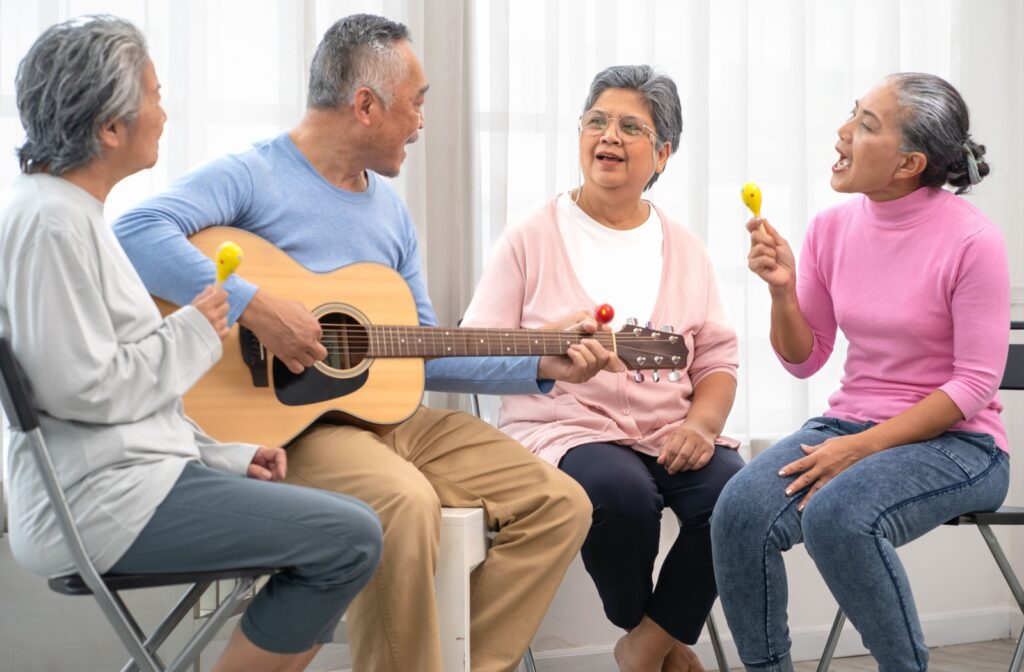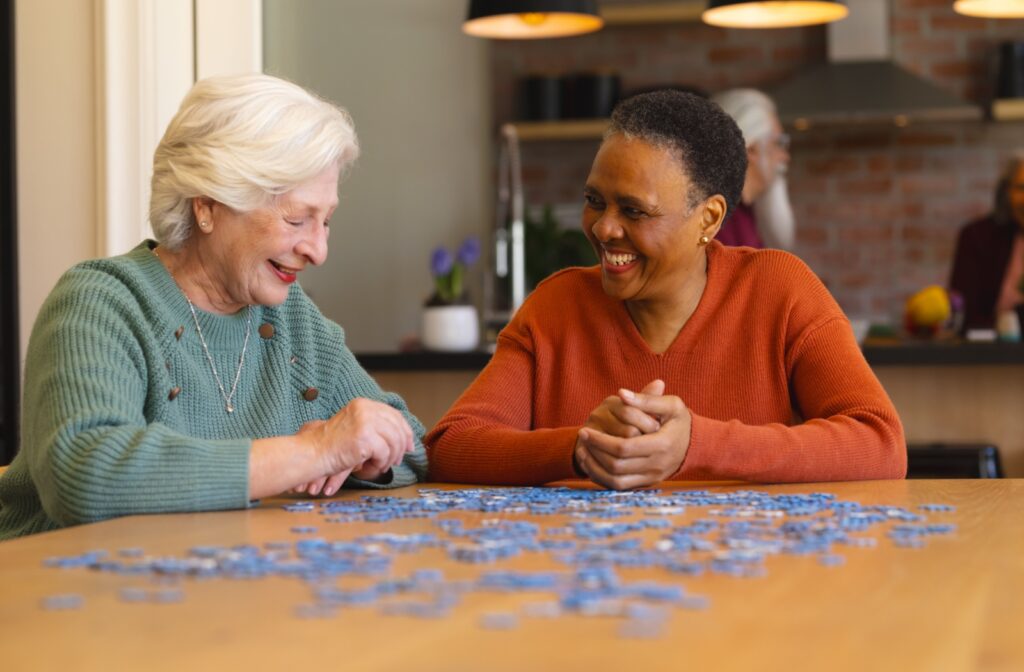Memory care communities provide structured, engaging environments for seniors living with Alzheimer’s or other forms of dementia. While memory loss can present challenges, the right activities can improve overall well-being.
Memory games like puzzles, trivia, matching games, storytelling, and word association activities help stimulate cognitive function, encourage recall, and promote social engagement.
Various daily activities can help seniors stay engaged, reduce anxiety, stimulate the mind, promote relaxation, and maintain a sense of identity to create moments of joy.
How Memory Games Help Cognitive Function
Memory games can effectively stimulate brain activity, strengthen recall abilities, and enhance cognitive function. These activities engage different brain areas, helping to maintain mental agility and slow cognitive decline.
Key Benefits of Memory Games
Games can make brain stimulation enjoyable, such as:
- Matching games, trivia, & storytelling exercises reinforce memory by prompting seniors to retrieve or recall information
- Puzzles & word association games challenge cognitive processing, problem-solving, & strategic thinking
- Games like Sudoku & card matching require concentration, helping to enhance focus & attention span
- Group games encourage social interaction through communication & collaboration, reducing feelings of isolation
- Successfully completing a game builds confidence, promotes a sense of accomplishment, & reinforces cognitive abilities
By incorporating memory games into daily routines, seniors can stay mentally active, engaged, and connected, improving their overall well-being in a fun and meaningful way.

Music Therapy
Music can profoundly impact memory and emotions, making it a valuable tool for seniors with cognitive decline. Listening to familiar songs can spark memories, improve mood, and reduce anxiety.
Many people find comfort in hearing music from their past, as it can take them back to meaningful moments in their lives.
Ways to Incorporate Music Therapy
There are many ways seniors can benefit from music therapy:
- Sing-alongs encourage engagement & memory recall
- Personalized playlists with familiar songs spark emotional connections
- Playing simple instruments, such as drums or maracas, allows active participation
- Live performances by musicians or choirs provide entertainment & social interaction
- Gentle movement or dancing to music enhances coordination & mood
Even those with progressed memory loss often respond positively to music therapy, showing signs of recognition and emotional connection.
Arts & Crafts
Creative expression offers an excellent outlet for self-discovery, fine motor skill development, and emotional well-being. Painting, coloring, and crafting help older adults express themselves while providing a sense of accomplishment.
Examples of Engaging Arts & Crafts for Seniors
Some great ways to get started include:
- Painting & drawing with watercolors or colored pencils for a low-stress creative experience
- Scrapbooking with old photographs & familiar images to reinforce identity
- Knitting or crocheting simple projects that encourage focus & relaxation
- Seasonal crafts such as decorating ornaments, making greeting cards, or creating flower arrangements
- Clay or pottery projects that provide a tactile, sensory experience
Focusing on the process rather than the final product creates a stress-free and enjoyable activity.
Gardening
Spending time in nature has been shown to reduce stress, improve mood, and promote relaxation. Gardening provides a soothing, hands-on activity that engages the senses and fosters a sense of purpose.
Memory-Supportive Gardening Activities
Simple ways to inspire a green thumb include:
- Planting flowers, herbs, or vegetables in raised garden beds for accessibility
- Watering & pruning plants as part of a simple daily routine
- Arranging flowers to encourage creativity & sensory engagement
- Harvesting vegetables to foster a sense of accomplishment & connection to nature
- Sitting in a peaceful garden space to enjoy fresh air & sunlight
Gardening is easily adaptable to different ability levels, enabling all residents to participate at their own pace.
Brain Games & Puzzles
Mental stimulation is a key component of cognitive health, and brain games help keep the mind engaged and active. Activities such as crossword puzzles, sudoku, trivia, and memory games challenge different areas of the brain while offering a sense of fun and accomplishment.
Brain-Boosting Activities
Some brain-boosting activities seniors can try include:
- Jigsaw puzzles that promote problem-solving skills & teamwork
- Matching games to encourage memory recall & cognitive function
- Storytelling activities where seniors complete a sentence or tell a short tale
- Trivia contests with questions related to music, history, or personal experiences
- Simple sudoku or number-based puzzles that support logical thinking
Card and board games can encourage group engagement while stimulating the brain, combining the benefits of social interaction and memory activities.
Pet Therapy
Interacting with animals provides emotional comfort and companionship, reducing feelings of loneliness and stress. Pet therapy is especially beneficial for seniors in memory care, as it can increase social engagement, lower blood pressure, and bring moments of joy.
Ways to Introduce Pet Therapy
Some ways to introduce pet therapy include:
- Therapy dog visits that provide companionship & encourage interaction
- Small animal interactions with rabbits, birds, or guinea pigs for sensory stimulation
- Community pets, such as a cat or a fish tank, can create a calming presence
- Simple pet care tasks, like brushing a dog or feeding fish, foster routine & responsibility
Even brief interactions with animals can have a lasting impact on mood and overall well-being.
Storytelling & Reminiscing
Encouraging seniors to share their life stories can reinforce their sense of identity and provide opportunities for meaningful conversations. Memory support activities often include group storytelling, sharing family photos, and discussing past experiences to stimulate memory recall.
Ideas for Storytelling & Reminiscence
Caregivers can encourage storytelling and reminiscence through:
- Memory boxes filled with familiar objects that trigger memories
- Family photo albums that encourage discussions about meaningful life moments
- Group storytelling sessions where residents contribute to a shared story
- Themed discussions about past holidays, careers, or childhood experiences
- Music or scent-based reminiscence activities that connect to specific memories
These sessions help preserve personal history and create deeper connections between residents, caregivers, and family members.
Gentle Exercise & Movement
Physical activity benefits the body and mind, and regular movement can improve mobility, circulation, and overall cognitive health. Exercise programs in memory support communities focus on low-impact activities accessible to seniors with varying mobility levels.
Safe Exercise Options for Memory Care
Many exercises can be modified to meet individual physical capabilities, including:
- Chair yoga to improve flexibility & relaxation
- Tai chi for gentle movement & balance enhancement
- Dancing or rhythmic movement to music for coordination & social engagement
- Light resistance exercises using resistance bands or small weights
- Nature walks or supervised strolls for fresh air & gentle activity
Exercise sessions are designed to be adaptable, making them enjoyable for seniors at different ability levels.
Creating Meaningful Experiences at Bethany Village
Memory care should go beyond daily support to enhance quality of life through engaging activities and personal connections. A well-rounded memory care program incorporates music therapy, creative arts, gardening, social engagement, pet therapy, and movement to provide a fulfilling experience for residents.
At Bethany Village, every activity is designed to promote mental, emotional, and physical well-being while fostering a sense of community. If you’re looking for a compassionate memory care program that prioritizes meaningful experiences, contact Bethany Village today to learn more about our services and schedule a visit.

